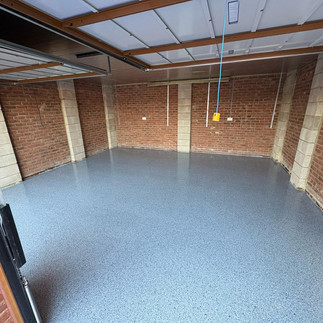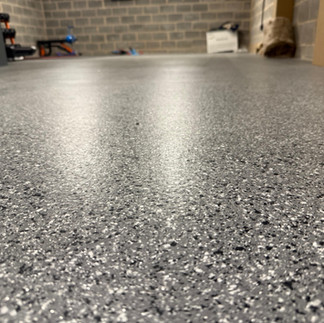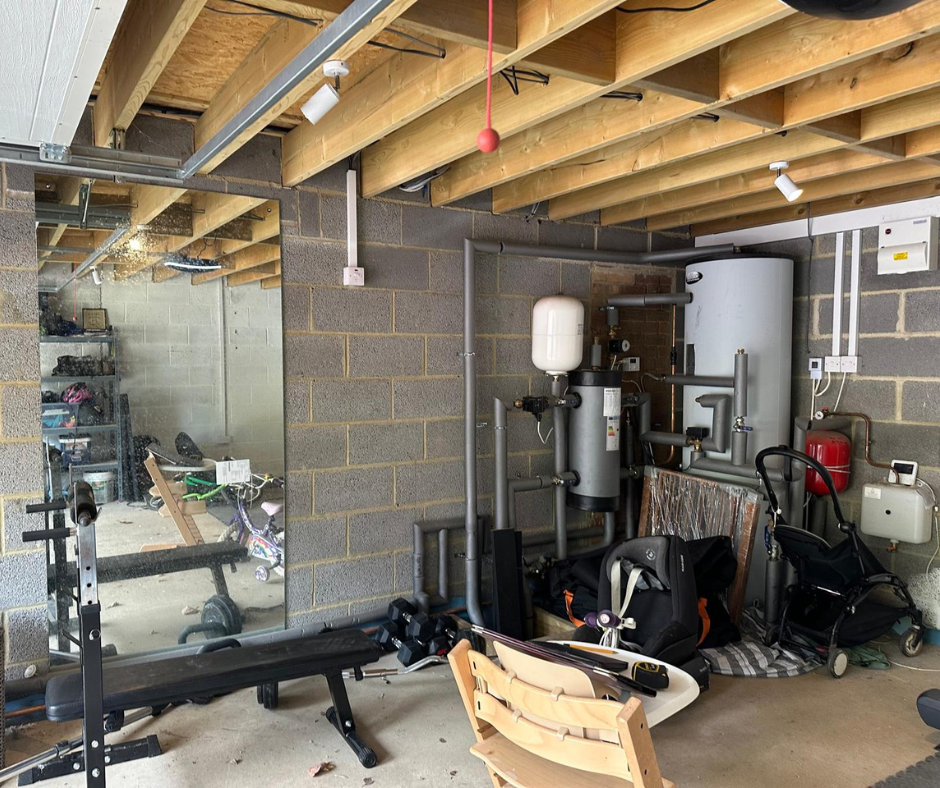What's the best type of Garage Flooring?
- The Modern Garage Company

- Oct 2, 2025
- 4 min read
When it comes to upgrading your garage, flooring is one of the biggest decisions you’ll make. Not only does it set the tone for the overall look, but it also needs to withstand daily wear and tear, from parked cars and muddy boots to tools, bikes, and sports equipment. With so many choices available, it can feel overwhelming to know which option is best.
Here, we explore the most common garage flooring options, their pros and cons, and why premium solutions like resin and tiles stand out above the rest.

MMA Resin Flooring
MMA Resin is often considered the premium choice for garage flooring. At The Modern Garage Company, we use our very own GarageTuff MMA Resin Flooring, which is seamless, extremely durable, and resistant to chemicals, oils, and tyre marks. It has a polished, luxury look and can be customised with different finishes and colours.
Pros:
Seamless and sleek appearance for a luxury feel
Extremely durable, resistant to chemicals, oil, and heavy use
Easy to clean and maintain
Adds real value to the home
Cons:
Requires professional installation
Higher cost compared to other flooring types
Best for: Homeowners looking for a long-lasting, high-end finish that transforms the garage into a true extension of the home.

Interlocking Floor Tiles
A very popular choice, interlocking floor tiles are hard-wearing PVC tiles designed to withstand the weight of cars and motorbikes. They are designed for heavy-duty use, making them a practical and stylish choice. They’re installed directly over the existing concrete floor and lock tightly into place, creating a neat and resilient surface. With a range of colours and textures available, you can even design custom layouts such as borders or parking bays.
Pros:
Quick and easy installation — no need for adhesives
Tiles can be replaced individually if damaged
Reduces dust from bare concrete floors
Warmer and more comfortable underfoot
Cons:
Not as seamless or luxurious as resin
Costs more than paint or flimsy tiles
Best for: Those who want a smart, durable, and versatile option without the higher investment of resin.

Tuff Tiles
Tuff Tiles are another robust tile system built for strength and practicality. They’re designed for garages that need a hard-working floor that looks neat but can also cope with cars, motorbikes, and everyday activity. A great middle ground between resin and interlocking tiles, Tuff Tiles provide long-term reliability at a competitive price.
Pros:
Ideal for garages that double as workshops or gyms
Ventilated design allows airflow beneath, preventing trapped moisture
Easy to install and remove if you move home
Very strong and built to last
Cons:
Less seamless appearance
Open-grid design means dirt can collect underneath
Best for: Multi-purpose garages or car enthusiasts who want a tough, practical surface.
Other Common Options
Paint
Floor paint is often the first option people think of when looking for a quick upgrade. It’s inexpensive and easy to apply, but it rarely lasts. Heavy use from cars or even dragging boxes across the floor will cause paint to chip and peel, meaning frequent reapplication.
Pros: Low upfront cost, DIY-friendly
Cons: Chips and peels quickly, doesn’t last under car tyres, requires frequent reapplication
Epoxy Coatings
Epoxy is similar to resin but less advanced. It creates a glossy finish and is stronger than standard paint, but it doesn’t perform as well in terms of longevity. Epoxy is prone to yellowing, marking, and peeling over time — particularly in garages where temperature and moisture levels vary.
Pros: More durable than paint, available in different finishes
Cons: Prone to peeling and cracking if the surface isn’t perfectly prepared, less hard-wearing than resin
Ceramic Tiles
Ceramic tiles give a very sleek look but are rarely practical for garages. They can be slippery when wet, prone to cracking under vehicle weight, and grout lines quickly collect dirt and oil. While they work in kitchens or bathrooms, garages demand more robust solutions.
Pros: Stylish, wide range of finishes
Cons: Slippery when wet, prone to cracking under heavy loads, costly to install
Cheap Flimsy Tiles
There are plenty of low-cost plastic or foam tiles available online, and while they may seem like a bargain, they simply aren’t designed for garage use. They shift, warp, and deteriorate quickly under the weight of vehicles or regular use.
Pros: Very cheap, easy to lay
Cons: Not durable, can split under weight, often look untidy after a short time
So what's the best type of Garage Flooring?
The best choice depends on how you use your garage. If it’s purely for parking, interlocking or tuff tiles may be more than enough. For a space that doubles as a gym, workshop, or luxury extension of your home and requires a tough finish, resin offers the ultimate option.
Cheap options like paint or flimsy tiles may seem appealing initially, but they rarely stand the test of time and often lead to disappointment. Investing in a quality flooring solution means a cleaner, warmer, and far more functional garage that you’ll enjoy for years to come.
Here at The Modern Garage Company, we believe that your garage deserves the same attention as the rest of your home. By choosing the right garage flooring, you can completely change the look and feel of the space while ensuring it stands up to everyday use. Whether you prefer the sleek seamless look of resin, the practicality of interlocking tiles, or the rugged design of tuff tiles, the right choice will turn your garage into a space you’re proud of.
Get in touch to discuss your requirements and get a quote for upgrading your garage floor.






































Comments